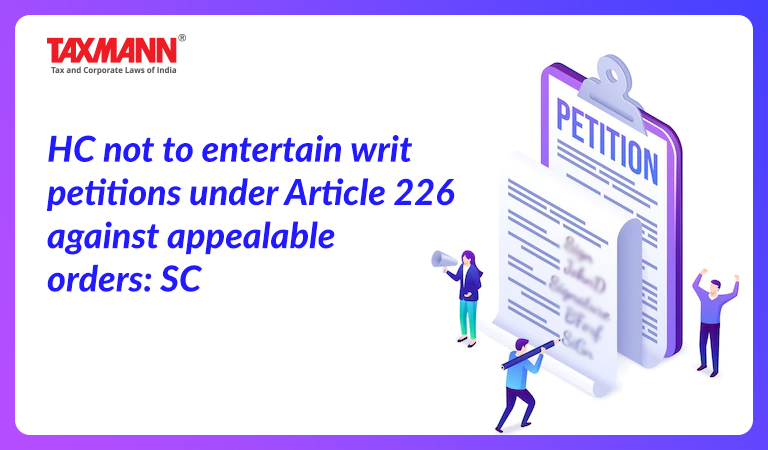HC not to entertain writ petitions under Article 226 against appealable orders: SC
- Blog|News|GST & Customs|
- < 1 minute
- By Taxmann
- |
- Last Updated on 18 October, 2022

Case Details: State of Madhya Pradesh v. Commercial Engineers and Body Building Co. Ltd. - [2022] 143 taxmann.com 195 (SC)
Judiciary and Counsel Details
-
- M.R. Shah & Krishna Murari, JJ.
Facts of the Case
The High Court of Madhya Pradesh entertained the writ petition under Article 226 of the Constitution of India and quashed and set aside the Assessment Order. The revenue feeling aggrieved and dissatisfied with the impugned judgment and order had filed appeal before the Apex Court.
Supreme Court Held
The Supreme Court noted that while entertaining the writ petition under Article 226 of the Constitution of India challenging the Assessment Order denying the Input rebate, the High Court has observed that there are no disputed question of facts arise and it is a question to be decided on admitted facts for which no dispute or enquiry into factual aspects of the matter is called for.
The aforesaid can hardly be a good/valid ground to entertain the writ petition under Article 226 of the Constitution of India challenging the Assessment Order against which a statutory remedy of appeal was available. Therefore, the Supreme Court allowed the appeal and it was held that the High Court ought not to have entertained the writ petition and the assessee was relegated to prefer an appeal before the appellate authority.
Disclaimer: The content/information published on the website is only for general information of the user and shall not be construed as legal advice. While the Taxmann has exercised reasonable efforts to ensure the veracity of information/content published, Taxmann shall be under no liability in any manner whatsoever for incorrect information, if any.

Taxmann Publications has a dedicated in-house Research & Editorial Team. This team consists of a team of Chartered Accountants, Company Secretaries, and Lawyers. This team works under the guidance and supervision of editor-in-chief Mr Rakesh Bhargava.
The Research and Editorial Team is responsible for developing reliable and accurate content for the readers. The team follows the six-sigma approach to achieve the benchmark of zero error in its publications and research platforms. The team ensures that the following publication guidelines are thoroughly followed while developing the content:
- The statutory material is obtained only from the authorized and reliable sources
- All the latest developments in the judicial and legislative fields are covered
- Prepare the analytical write-ups on current, controversial, and important issues to help the readers to understand the concept and its implications
- Every content published by Taxmann is complete, accurate and lucid
- All evidence-based statements are supported with proper reference to Section, Circular No., Notification No. or citations
- The golden rules of grammar, style and consistency are thoroughly followed
- Font and size that’s easy to read and remain consistent across all imprint and digital publications are applied



 CA | CS | CMA
CA | CS | CMA
